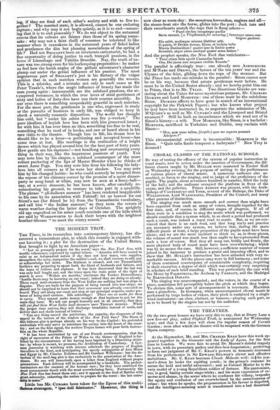CHORAL CLASSES OF THE NATIONAL SCHOOLS.
BY way of testing the efficacy of the system of popular instruction in vocal music, now in action under the sanction of Government, the dif- ferent classes taught by Mr. Flummt were mustered in Exeter Hall on Wednesday evening, for the purpose of uniting in the performance of various pieces of choral music. A numerous audience also as- sembled, to listen to the singing, and to judge of the proficiency of the pupils. The pupils, about seventeen hundred in number, filled the body of the hall; and the audience occupied the platform in front of the organ, and the galleries. Prince ALBERT was present, with the Arch- bishops of CANTERBURY and Yon, several of the Bishops, the Duke of WFisaticToti, Lord WARNCISETE, President of the Council, and many other persons of distinction.
The singing was much more smooth and correct than might have been expected from such an army of voices, brought together for the first time, and, of course, in different stages of progress. If all of them were in a condition to sing the music which was performed, we should conclude that a system which, in so short a period had produced such a result, was indeed a royal road to music. But, as we are con- vinced that there is no such road, and that long study and practice are necessary under any system, we believe that, during the more difficult pieces at least, a large proportion of the pupils must have been silent ; and we are the more inclined to think so, as, in those pieces, the volume of sound was much less than ought to have proceeded front such a host of voices. Had they all sang out, boldly and firmly, the mere physical body of sound must have been overwhelming ; which was by no means the case. Still, however, a sufficient number of voices joined in the harmony to produce a grand and imposing effect, and to show that Mr. Htrixeres instruction has been attended with very re- markable success. All the pieces sung were in full harmony ; and some of them contained counterpoint of considerable complexity, requiring in their execution a degree of skill which was certainly very surprising in scholars of such brief standing. This was particularly the case with the Motet by PALESTRINA, the Anthem by FARRANT, and the Madrigal by BALTHAZAR DONATO. The singing was unaccompanied ; and the voices, in the course of a piece, sometimes fell perceptibly below the pitch at which they began. To obviate this, some sort of accompaniment is necessary. MAINZER uses a pianoforte. In Germany, when unaccompanied choral music is performed by large bodies of voices, their pitch is sustained by a single wind-instrument—an oboe, clarinet, or bassoon—playing each part, so as to be heard by the singers but not by the audience.
























 Previous page
Previous page